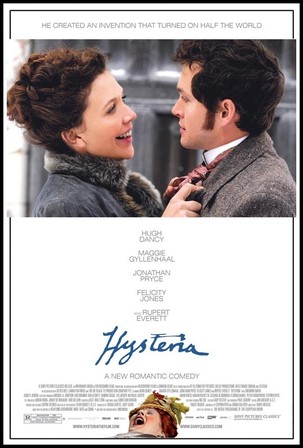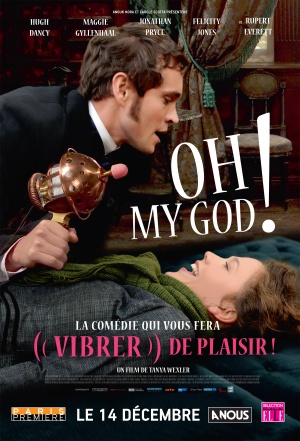_Hysteria: Why It's Buzzworthy
May 2012

You know how you have to sit through the full credits of Marvel Comics movies in order to catch an interesting surprise?
Well, doing so after seeing Hysteria provides its own unique experience to marvel. Audiences are treated to a parade of images, equal parts enlightening and educational, chronicling the metamorphosis of the vibrator.
Yes, people, Hollywood has gone there - they've made a romantic comedy about the world's most popular sex toy and its unsung influence on society. Considering the average formula for a Hollywood film consists of any or all of the three M's - murder, mafia, and misbehaved women,
the burning question post-viewing becomes:
How has this not been done sooner?!
From clunky and crude hair dryer-esque designs to the modern-day "I Rub My Duckie," the vibrator's evolution is quite a story for the ages, as the filmmakers would have one believe. Oddly, director Tanya Wexler and screenwriters Stephen and Jonah Lisa Dyer succeed in glamorizing the device and its origin, evoking the sense that it ranks among the most prolific inventions in history, like the light bulb and indoor plumbing.
After all, in the age of the proper, repressed Victorian, it was only a matter of time before someone thought to combine the two and add a little more shock to the concept of "indoor plumbing."
Based on real events, so begins the story of Dr. Mortimer Granville, played by the handsome and charming
Hugh Dancy (better known as Why I'm Forever Jealous of Claire Danes). Granville is a well-meaning physician desiring a stable position that will allow him to provide the best care available for the disease-ridden patients of
19th Century England.
Down on his luck, he happens upon the practice of Dr. Robert Dalrymple (Jonathan Pryce) who specializes in treating women with nervous afflictions like anxiety, irritability, and frustration...a.k.a. being alive. While under his care, female patients undergo massages of a private nature in order to relieve their tensions unaddressed in the home. In 1880's society, these consultations were purely for clinical purposes and not considered sexual, a fact which the story relies heavily on for humor. Nearly a quarter of the female
population were estimated to suffer from the blanket "hysteria" diagnosis and found themselves turning to a
Gyno for an "Oh, yes!"
The young doctor goes fingers first into his new routine and soon develops a rather annoying and debilitating hand cramp. The injury leads to his dismissal - a rather unhappy ending for Granville, who through his employment was also to gain an arranged marriage with the younger of two Dalrymple daughters, Emily (Felicity Jones).
Eldest daughter Charlotte, portrayed spiritedly by should-really-be-British Maggie Gyllenhaal, crusades for civil rights and finds an adversary in Dr. Granville, who doesn't shudder at the concept of women's suffrage or similar progressive opportunities. Mortimer's all, "You say you want a revolution," and she's all, "Well, you know..."
They bond over their knowledge of germ theory, 'cause back then, the idea of invisible parasites was totally asylum-worthy except to smartypants science nerds. However, they form a predominantly argumentative relationship which may speak more towards passion than loathing.
Amongst the quandaries of his love life, Granville is desperate to reconcile his career with Dr. Dalrymple and seeks counsel with privileged best friend and comic foil, Edmund St. John-Smythe (Rupert Everett), a technology whiz conveniently experimenting with electricity. Inspired by one of the eccentric inventor's designs, Granville creates the world's first electric massager and thereby a climactic solution that simultaneously eases Mortimer's spasms and creates speedier and more enjoyable versions for his patients. For the next century and counting, desperate housewives would be abuzz!
Hysteria is a quintessential addition to the Colin Firth and Emma Thompson class of British cinema. The script is clever and facetious and harkens back to a refined language that makes you want to actually employ your word-of-the-day calendar, because you've betrayed the English vocabulary long enough. More than just a salacious-sounding premise, Hysteria comments on an Old World transitioning to the New, a society on the precipice of great change and the brilliant minds who enacted it.
Whether you're laughing out of embarrassment or genuine hysterics, Hysteria will leave you tickled in more ways than one.
Hysteria is currently in limited release.
Visit the film's official site for insight into the production and the fascinating history of hysteria.
Links: Official Site | IMDB | Facebook | Twitter
Oh, and if you're still not convinced, hopefully this French poster will entice you. Just because.
Well, doing so after seeing Hysteria provides its own unique experience to marvel. Audiences are treated to a parade of images, equal parts enlightening and educational, chronicling the metamorphosis of the vibrator.
Yes, people, Hollywood has gone there - they've made a romantic comedy about the world's most popular sex toy and its unsung influence on society. Considering the average formula for a Hollywood film consists of any or all of the three M's - murder, mafia, and misbehaved women,
the burning question post-viewing becomes:
How has this not been done sooner?!
From clunky and crude hair dryer-esque designs to the modern-day "I Rub My Duckie," the vibrator's evolution is quite a story for the ages, as the filmmakers would have one believe. Oddly, director Tanya Wexler and screenwriters Stephen and Jonah Lisa Dyer succeed in glamorizing the device and its origin, evoking the sense that it ranks among the most prolific inventions in history, like the light bulb and indoor plumbing.
After all, in the age of the proper, repressed Victorian, it was only a matter of time before someone thought to combine the two and add a little more shock to the concept of "indoor plumbing."
Based on real events, so begins the story of Dr. Mortimer Granville, played by the handsome and charming
Hugh Dancy (better known as Why I'm Forever Jealous of Claire Danes). Granville is a well-meaning physician desiring a stable position that will allow him to provide the best care available for the disease-ridden patients of
19th Century England.
Down on his luck, he happens upon the practice of Dr. Robert Dalrymple (Jonathan Pryce) who specializes in treating women with nervous afflictions like anxiety, irritability, and frustration...a.k.a. being alive. While under his care, female patients undergo massages of a private nature in order to relieve their tensions unaddressed in the home. In 1880's society, these consultations were purely for clinical purposes and not considered sexual, a fact which the story relies heavily on for humor. Nearly a quarter of the female
population were estimated to suffer from the blanket "hysteria" diagnosis and found themselves turning to a
Gyno for an "Oh, yes!"
The young doctor goes fingers first into his new routine and soon develops a rather annoying and debilitating hand cramp. The injury leads to his dismissal - a rather unhappy ending for Granville, who through his employment was also to gain an arranged marriage with the younger of two Dalrymple daughters, Emily (Felicity Jones).
Eldest daughter Charlotte, portrayed spiritedly by should-really-be-British Maggie Gyllenhaal, crusades for civil rights and finds an adversary in Dr. Granville, who doesn't shudder at the concept of women's suffrage or similar progressive opportunities. Mortimer's all, "You say you want a revolution," and she's all, "Well, you know..."
They bond over their knowledge of germ theory, 'cause back then, the idea of invisible parasites was totally asylum-worthy except to smartypants science nerds. However, they form a predominantly argumentative relationship which may speak more towards passion than loathing.
Amongst the quandaries of his love life, Granville is desperate to reconcile his career with Dr. Dalrymple and seeks counsel with privileged best friend and comic foil, Edmund St. John-Smythe (Rupert Everett), a technology whiz conveniently experimenting with electricity. Inspired by one of the eccentric inventor's designs, Granville creates the world's first electric massager and thereby a climactic solution that simultaneously eases Mortimer's spasms and creates speedier and more enjoyable versions for his patients. For the next century and counting, desperate housewives would be abuzz!
Hysteria is a quintessential addition to the Colin Firth and Emma Thompson class of British cinema. The script is clever and facetious and harkens back to a refined language that makes you want to actually employ your word-of-the-day calendar, because you've betrayed the English vocabulary long enough. More than just a salacious-sounding premise, Hysteria comments on an Old World transitioning to the New, a society on the precipice of great change and the brilliant minds who enacted it.
Whether you're laughing out of embarrassment or genuine hysterics, Hysteria will leave you tickled in more ways than one.
Hysteria is currently in limited release.
Visit the film's official site for insight into the production and the fascinating history of hysteria.
Links: Official Site | IMDB | Facebook | Twitter
Oh, and if you're still not convinced, hopefully this French poster will entice you. Just because.




